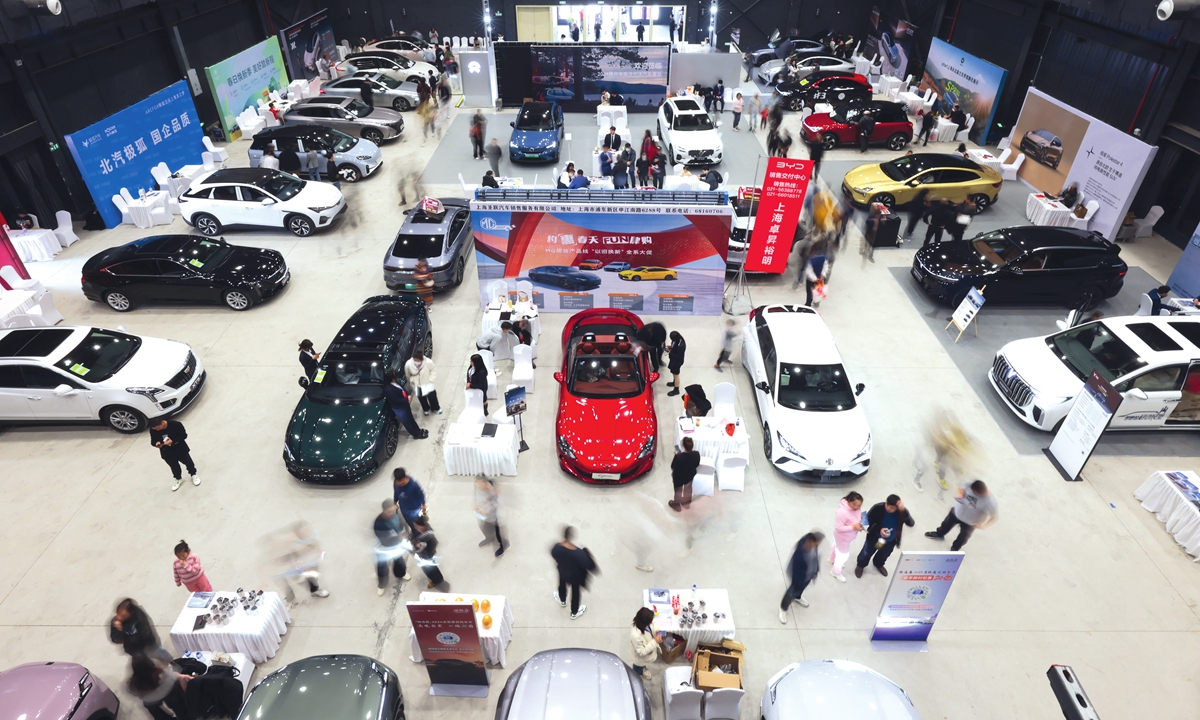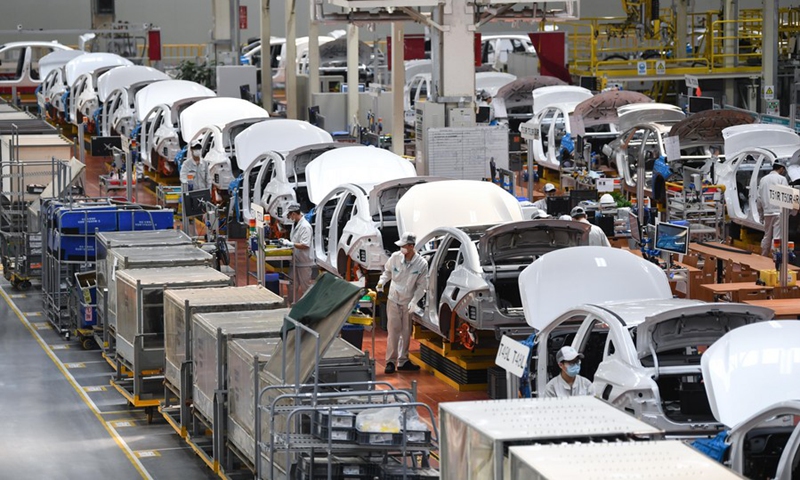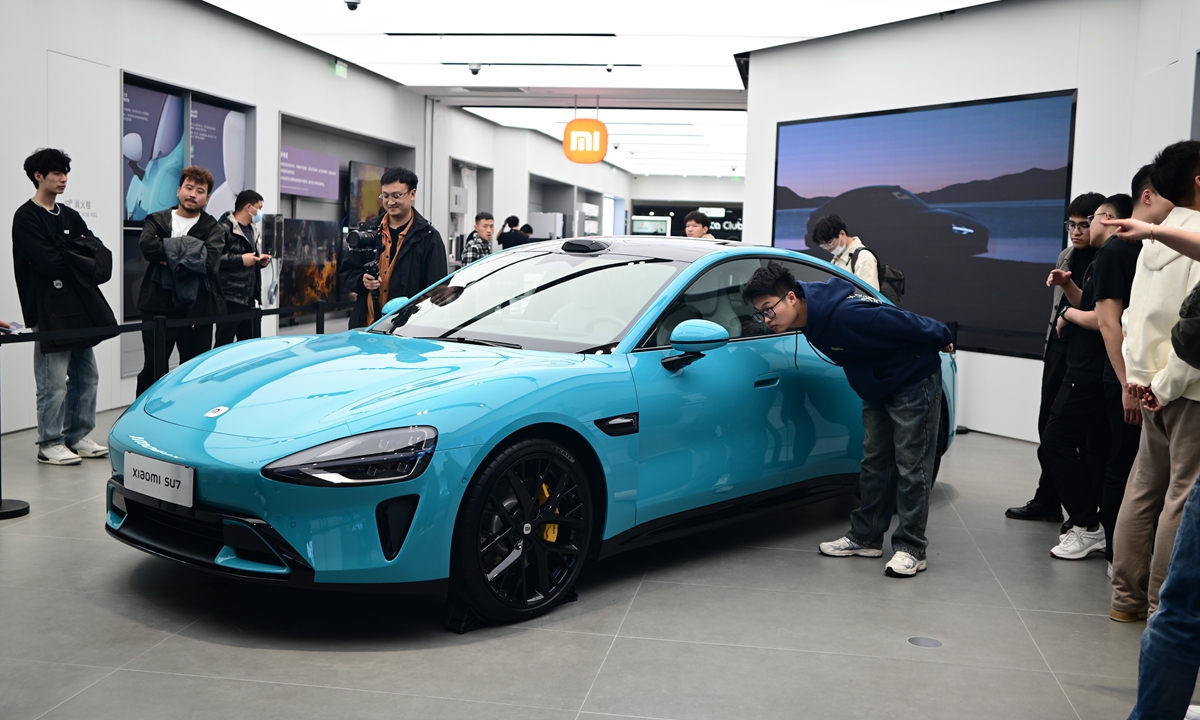With Xiaomi SU7 jumping to foray, customers are all smiles to embrace lower EV prices

Consumers browse NEVs at a car fair in Shanghai on March 23, 2024. Photo: VCG
On Sunday morning, the Global Times visited a Xiaomi store at a Beijing shopping mall. Despite it being the first working day after the Qingming Festival, there was a steady flow of vehement customers inquiring and trying out Xiaomi's first electric vehicle (EV) model SU7.
Xiaomi's high-note EV launch amid fanfare last week drew strong interest from the public and rivals alike, as dozens of Chinese EV makers and Tesla are jostling for a bigger market share in China.
The entry of the new brand and the overall trend of China's electric vehicle market have sent a strong signal for the industry's continued economic growth despite the fiercer competition, Chinese industry experts said.
A Xiaomi employee at the Beijing store told the Global Times that there had been large visiting crowds during recent holidays and weekends, leading to barriers being set up before the store as a precautionary measure to maintain order.
Some customers at the Xiaomi store told the Global Times that they were mostly drawn to the "exceptional value" contained in the Xiaomi SU7 model, compared to its similar-priced EV rivals.
A customer surnamed Xu told the Global Times although Xiaomi has been positioned as an affordable family brand in China, its strong resource integration capability could pose rising pressure for other domestic EV brands like XPeng and NIO.
Other customers say they would rather take a wait-and-see approach, given SU7 is Xiaomi's first EV model, to gauge the company's future progress.
Now, Xiaomi is working to increase its capacity to cope with massive orders. April 3 marked the official delivery of the Xiaomi SU7, where Lei Jun, founder of Xiaomi, announced that the Xiaomi SU7 has received domestic orders for more than 100,000 units.
Price war to escalate
Since its debut on March 28, the Xiaomi EV has become an internet sensation for its modern and sporty look, as well as its competitive prices. The SU7 series were launched with nine different colors, and their selling prices range from 215,900 yuan ($30,445.40) to 299,900 yuan ($42,290.76).
The launch of the Xiaomi SU7 has triggered a fierce price war within China's EV market. Following the release of the Xiaomi EV's price tag, a number of carmakers introduced their own incentives for buyers in order to prevail in the market.
Xiaomi's foray into the electric vehicle market competition is to boost EV sales and potentially reinvigorate the buying enthusiasm of the general public, Zhang Xiang, visiting professor at the Engineering Department of Huanghe Science and Technology University, told the Global Times on Sunday.
China's EV market landscape will be reshaped, he said.
XPeng announced it would offer up to a 20,000 yuan ($2,820.32) purchase subsidy for its new model, XPeng G9, while Huawei AITO M7 lowered its entry-level EV model by 20,000 yuan to 229,800 yuan ($32,405.52).
On April 3, Tesla (China) introduced a zero interest loan for the purchase of the latest models of Model 3 and Model Y cars in April, offering up to 60 months of interest-free installments.
The incentive comes as a U-turn after Tesla raised the price of the Model Y series by 5,000 yuan, which is believed to be a response to the increasing challenges posed by China's domestic EV rivals, analysts said.
The entry of Xiaomi will definitely chip away at some of Tesla's customer base and make it increasingly harder for other Chinese EV brands to sell their cars, Zhang said.
"I used to drive a Tesla, but now I want to switch to support domestic brands and my trust in Chinese-made EVs is strengthening," a customer surnamed Liu told the Global Times.
Tesla's deliveries declined by 8.5 percent in the first quarter to 386,810 vehicles from a year ago and the company produced 433,371 vehicles during the period, Reuters reported.
Its sales in China also came in lower than expected. In March, Tesla's sales in China market came in at 89,064 units, almost in line with last year.
Competition gets fiercer
In the long run, new market players will likely push rivals including Tesla to continue innovating and upgrading their products to maintain their market positions. It also provides an opportunity for other new electric vehicle companies to observe and learn the new business models and technological applications, Wang Peng, an associate research fellow from the Beijing Academy of Social Sciences, told the Global Times on Sunday.
Analysts believe that the entry of Xiaomi to the market competition will add fuel to the flames in a nationwide EV price war.
"With advancements in technology and the scale of production, it is anticipated that the costs will gradually decrease, potentially leading to a moderate reduction in prices," Wang said.
In 2023, production and sales of new-energy vehicles (NEVs) exceeded 9.58 million and 9.49 million units, surging 35.8 percent and 37.9 percent year on year, respectively, according to data from the China Association of Automobile Manufacturers (CAAM).
China's automobile exports soared 57.9 percent year-on-year to hit a record high of 4.91 million vehicles in 2023, as the country's automakers expanded their presence overseas. The massive growth was propelled by a surge in the exports of NEVs, which soared 77.6 percent to more than 1.2 million units.
"Market sales of NEVs are expected to continue to grow significantly, with projections exceeding 10 million units this year," Zhang said. "The exports of NEVs are expected to continue increasing thanks to China's manufacturing advantage in cost effectiveness and the level of intelligence in manufactured EVs."


